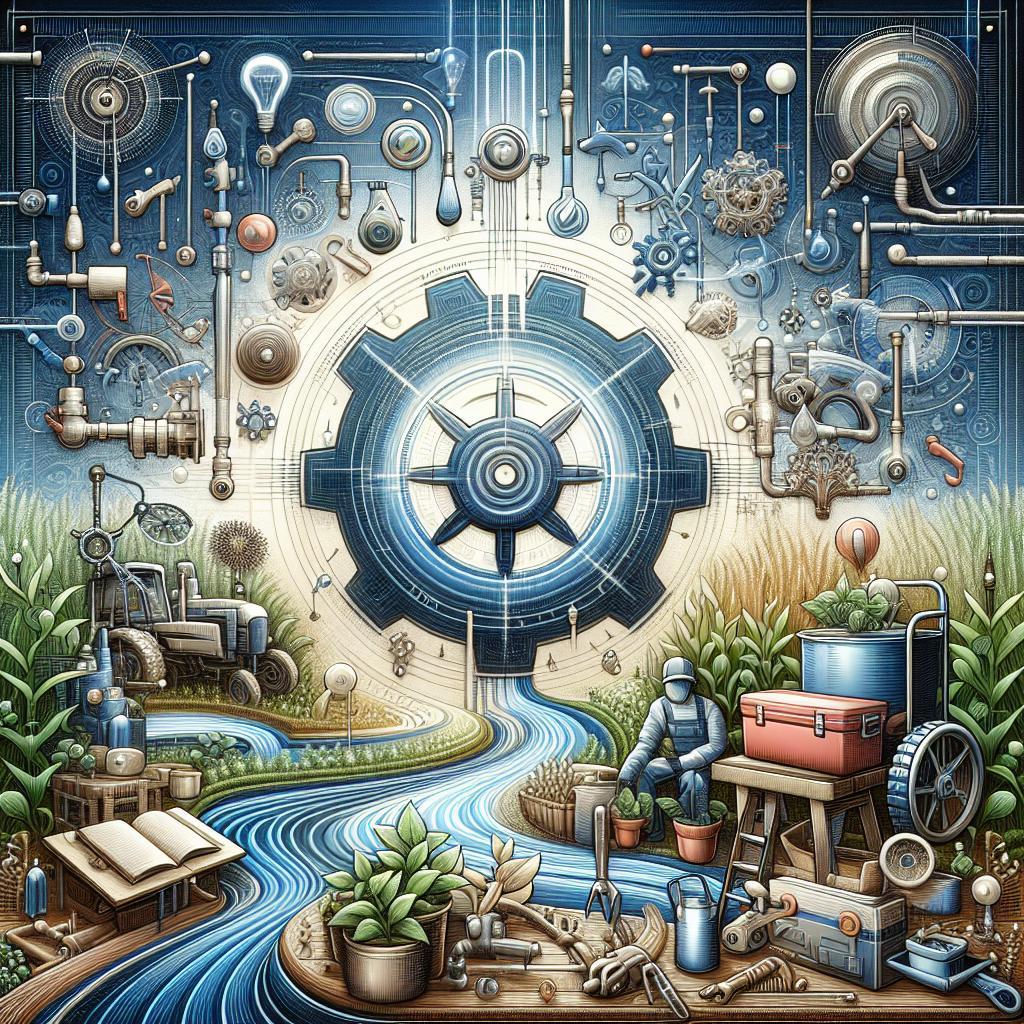This post may contain affiliate links which means I may receive a commission for purchases made through links. Learn more on my Private Policy page.
Unlocking the Green Potential: Essential Tools and Equipment for Irrigation System Installation
Imagine stepping into a garden that thrives with life—lush greens swaying gently in the breeze, vibrant blooms showcasing their colors, and the sweet smell of flourishing plants wafting through the air. Achieving this picturesque oasis isn’t merely the result of a green thumb; it begins with a robust irrigation system that nurtures every seed and sapling with the precise amount of water they need. But, before you can enjoy the fruits (and flowers!) of your labor, there’s the crucial task of installing that very system. Don’t fret! Whether you’re a DIY novice or a gardening guru, rolling up your sleeves to install an irrigation system can be a rewarding adventure filled with creativity and growth. In this article, we’ll explore the essential tools and equipment you’ll need to set the stage for notable gardens—and maybe even inspire a little magic along the way. So grab your gloves and let’s dig into the must-haves that will make your irrigation installation a breeze!
Choosing the Right Components for your Irrigation System
When it comes to designing an effective irrigation system, selecting the right components is crucial for ensuring healthy plant growth and efficient water use.Begin by considering water source options,such as wells,ponds,or municipal supplies,as these will influence the type of pump required. A wide range of pumps, from submersible to surface, is available, each with its unique characteristics.next, contemplate pipe types; PVC and polyethylene are popular choices due to their durability and ease of installation. Additionally, don’t overlook the importance of fittings and connectors — they ensure a leak-free system and should be compatible with the pipe size and type you select.
Within your system, an array of water delivery devices will optimize coverage. Drip emitters and soaker hoses are excellent for garden beds, while sprinklers can offer broader coverage for lawns or larger areas. Consider creating a control system to manage water flow efficiently; programmable timers can automate your irrigation schedule, making your system more user-friendly. Below is a brief comparison table of popular irrigation components to help you make informed choices:
| Component | Benefits | Best Use |
|---|---|---|
| Drip Emitters | Water directly to the roots, reducing evaporation | Flower and vegetable beds |
| Sprinklers | Cover large areas quickly | Lawn and open fields |
| PVC pipe | Durable and pressure-resistant | Main water lines |
| Polyethylene Pipe | Flexible and easy to install | Drip irrigation systems |

The Must-Have Tools for a Seamless Installation Experience
Creating a seamless irrigation system installation hinges on having the right tools at your disposal. Whether you’re planning to lay down tubing, install sprinkler heads, or connect various components, certain essentials can make your task more manageable. A high-quality trenching shovel will help you carve out pathways for your piping, while a pipe cutter ensures clean, precise cuts in your tubing, reducing the risk of leaks. Don’t forget to equip yourself with Teflon tape for securely sealing threaded joints, as well as a screwdriver set for fastening fixtures. A measuring tape is also vital,allowing you to lay out your design accurately and ensure you don’t run short on materials.
Additionally, investing in a level can make a significant difference in the alignment of your irrigation components, ensuring optimal performance. For larger installations, a post-hole digger can be invaluable for setting up support structures like stakes or poles. It may also be wise to have a garden hose handy for testing your system once installed. To keep everything organized, consider using a toolbox or storage system, which can minimize downtime by having your equipment ready at a moment’s notice. The right tools not only enhance efficiency but also elevate the overall quality of your project.

Expert Tips for Effective Installation and Maintenance
When it comes to installing an irrigation system, having the right tools on hand can significantly enhance the efficiency and effectiveness of your work. First and foremost, ensure you have basic hand tools such as shovels, trowels, and wrenches, which are vital for digging trenches and securing fittings. Additionally, a line level and measuring tape will help you achieve the proper slope for your hoses and pipes, ensuring optimal water flow. Don’t forget to equip yourself with a drill and various drill bits for creating holes and making necesary adjustments. Here’s a speedy checklist to keep in mind:
- Shovels and Trowels
- Wrenches
- Measuring Tape
- Line Level
- Drill and drill Bits
Maintaining your irrigation system is just as crucial as installation to ensure longevity and efficiency. Regularly check for leaks and blockages, and inspect all timer and valve functions to prevent any water wastage.Create a routine for cleaning filters and flushing the system; a simple annual flush can eliminate debris and prevent clogging. Utilize a maintenance checklist to keep track of tasks and visualize progress. Below is a straightforward table summarizing key maintenance procedures:
| Maintenance Task | Frequency |
|---|---|
| Check for leaks | Monthly |
| Clean filters | Every 3 months |
| Inspect hoses and fittings | Bi-annually |
| Flush system | Annually |

Maximizing Efficiency with Smart Irrigation Technology
Embracing the latest in smart irrigation technology can transform your landscape management strategies. These innovative systems utilize sensors and weather data to adjust water usage in real time, ensuring that plants receive the optimal amount of hydration. By integrating this technology, you not only conserve water but also significantly reduce utility costs. Smart controllers and irrigation apps allow for easy remote management, giving you the ability to monitor and manipulate your irrigation system from anywhere — a game changer for busy gardeners and landscapers alike.
To harness the true potential of these advancements,consider investing in essential equipment such as:
- Soil Moisture Sensors – Measure soil hydration levels to determine when watering is truly needed.
- Weather Stations - Gather real-time environmental data to optimize watering schedules.
- Automated Timer Systems – Set precise schedules that adjust based on local climatic conditions.
- Pressure Regulators – Ensure consistent water flow across your entire system.
When developing your irrigation system, it can be beneficial to compare different technologies to identify the best fit for your landscape needs. The table below outlines some popular smart irrigation solutions:
| System | Features | Cost |
|---|---|---|
| Rain Bird WiFi Controller | Remote access, weather-based adjustments | $$ |
| Netro Smart Sprinkler | AI-powered scheduling, easy installation | $$$ |
| Rachio 3 | Water-saving features, flexible zone management | $$$ |
| Orbit B-hyve | Smartphone control, customizable programming | $ |
Insights and Conclusions
As we wrap up our exploration of the essential tools and equipment for installing your irrigation system, we hope you feel inspired and equipped to dive into your next gardening or landscaping project! remember, the right tools can transform not just your plants’ lives but also your own, making the process smoother and more enjoyable. Whether you’re a seasoned pro or just starting out, every garden is a canvas waiting for your creative touch. So, gather those hoses, sprinkle in some innovative gadgets, and watch as your visions bloom into reality. Happy irrigating, and may your gardens flourish with the love and care you provide! 🌱✨
This post may contain affiliate links which means I may receive a commission for purchases made through links. Learn more on my Private Policy page.

